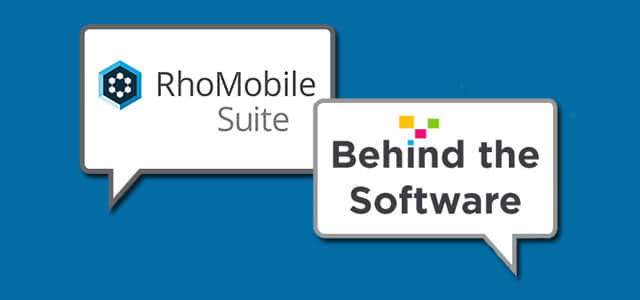Application Development
Let's Talk RhoMobile: Behind the Software Q&A with Motorola Solutions

Enterprise application development software is changing the business software industry. Mobile entrepreneurs are the future pioneers behind the “internet of things” and the force behind the de-clutterization of app stores. The RhoMobile Suite 5.0 launch last month brought a shower of features to help with just that: automatic push notifications, app store control and a never-before-seen pricing model.
Since Motorola Solutions acquired RhoMobile in 2011, the business focus has been on open source and economic mobile development. In short, they care about the developer. Business-Software.com had the pleasure of speaking to Mark Kirstein, Motorola Solutions’ Senior Director of Project Management solutions, about the rapid evolution that both RhoMobile and Motorola Solutions are undertaking. In our Q&A with Motorola Solutions, we talk about the new developer-centric world, the internet-of-things future and the complexities of building business software.
Tell us what sparked RhoMobile’s conception and how it had hoped to impact the mobile development realm.
It all started with a gentleman by the name of Adam Blum, who is a serial entrepreneur and adjunct professor at Carnegie Mellon. He held many key roles in a number of different companies like Good Technology and Microsoft. The concept of RhoMobile emerged in 2008 as a new era of smartphones emerged. Back then, smartphones were used largely in the enterprise by sales guys who needed constant email access.
In those days, the dominant tool was a traditional FFA Salesforce application on your BlackBerry device. We also had Windows Mobile CE deployment, which was used for field service technicians. But when this new era of smartphones moved into the consumer space, that was the time to reinvent mobile.
We had to ask: how do we leverage web skills and technologies without requiring someone to be an expert in iOS or Android development? And then we arrived at RhoMobile.
RhoMobile is going through a lot of changes currently with the Motorola Solutions acquisition in 2011 and now Zebra Technologies this year. How has that affected the business and the business decisions of RhoMobile?
It means nothing but good things. When Motorola Solutions acquired RhoMobile in 2011, we had considered RhoMobile, PhoneGap, and Appcelerator. Those were the three leading platforms in the market, creating the next generation mobile application platform. We noticed a massive craze around consumerization. Everyone wanted to know, “How do I build a consumer app that’s cross-platform, put it up on the app store and get a million downloads?” Along with that, they also wanted to know how to drive ad revenue. Since Motorola Solutions’ focused on delivering enterprise mobile solutions, we felt that the enterprises were getting lost in the consumerization noise. Enterprise is a smaller piece of the market share in comparison to consumer apps – but enterprises still needed the right tools and the right platform.
That’s where RhoMobile comes in. It had a unique feature set and capabilities that other platforms didn’t have. Motorola acquired it. We continued to invest in it, growing investment from a development perspective, expanding the breadth and depth of software and adding new capabilities.
“Building mobile apps is not any easier; the complexities are only growing.”
Now, if you take a look at Zebra Technologies, they are coming to market with a new platform called Zatar, focused on the Internet of Things. When you think of Motorola, you think of mobile computers — a business of readers and writers. But now, with Zebra, we have the sensors’ business as well as the printing business.
The key challenges for any business [are that] they are soon going to be looking at wireless routers in the ceiling, data capture scanners at the front of the stores and ID sensors when shipments come in. And they would like to have sensors throughout the stores that route theirs customers and consumers. The next thing you know, their whole world is a complex world of data and different systems.
And be warned — you must pick the right solution to do that. Building mobile apps is not any easier; the complexities are only growing. We must think about what integration really means. We must unify everything. And there, amidst all of that, is RhoMobile.
The combined solution of Zebra and Motorola Solutions’ enterprise business for your mobile technologies, coupled with Zatar and RhoMobile, gives enterprises a platform that enables you to build robust solutions.
What are the challenges between developing for B2B developers as opposed to B2C?
The lines and the scenarios can be gray – though, at some point, we have to take a hard stance and draw a line. For us, consumer apps are largely about consuming information — me downloading an app. I might leverage the Target app, for example, so I get a consumer experience. In that scenario, I’m consuming the information that Target is offering. But I’m not updating things like quantities or pricing. I’m not approving anything. The mentality is “I’m consuming information.”
Also, consumers say it’s fine when apps only work when connected to the internet. They’re focused on experience at the point of contact. But on the flipside, enterprise apps are data-centric. With enterprise, I’m doing inventory. I’m pricing. I’m marking items down and discounting. I can be a field service technician repairing equipment, updating what part number I used and whether it’s under warranty. I don’t want to consume information. I want to manage it.
On an enterprise app, the data needs to be secure and I need to work offline. I should always be able to perform mission-critical business work, internet access or not.
RhoMobile’s built to not only deal with content delivery, but also with content management – input it, update it and control it.
Speaking of that strong RhoMobile philosophy, let’s dive into the RhoMobile Suite 5.0 launch. What features are you most excited about in this new launch?
RhoMobile Suite 5.0 is a fantastic launch. It focuses on cloud services and capabilities coupled with a transparent pricing model. Traditional enterprise platforms usually charge on a per device model. Motorola is the first and the only enterprise platform based on an open-source component with value-added services that developers can buy if they need extra services, and those services are available on a per-developer pricing model.
The industry has some great consumer platforms that are free of charge, but they aren’t suited to build enterprise applications. And some fantastic enterprise applications platforms offer complex per-user pricing models, but we’re the first to bridge the gap.
We’re also sticking with that theme of enterprise capabilities – operating offline and managing data. Dealing with data in an offline fashion is challenging. You would need data synchronization to make sure data is reliably delivered.
Those are burdens the developer has to carry. That’s why we have introduced RhoConnect as a hosted service in the cloud. We’ve had RhoConnect around for a number of years, and it’s one of the fastest synchronization solutions out there. Synchronization services are often difficult to use and consume, but we solved that problem by providing it as a simple turnkey offering hosted in the cloud.
![]()
The release of 5.0 has also added the ability to support push messaging and notifications cross-platform. When developers do that today, they manage each device platform separately. But we’re providing a single mechanism across all platforms. RhoMobile’s platform handles it, dealing with each platform’s native capabilities on its own.
RhoMobile makes the developer’s job a lot easier. And here’s a unique thing that we offer: your own application store. We have observed a big movement toward mobile device and application management. So we have an open-source application called RhoGallery. And it comes included with the RhoMobile Suite.
Overall, RhoMobile 5.0 brings transparent pricing, automatic push notifications and the ability to build your own private enterprise app store. This is a huge, developer-centric update that everyone’s excited about.
Because RhoMobile 5.0 includes open source elements, how do you think the open source factor will affect the business as it ages? Particularly with Rhodes.
Motorola Solutions doesn’t often brag about its involvement in open source initiatives, but RhoMobile Suite is in fact built on top of an open source platform called Rhodes.
Rhodes is highly used. It’s even taught at universities in Malaysia and several authors have written books on it. The community is massive — something we will continue to grow. Because of the modern view on software, people have a hard time thinking about software without a larger community behind it, and therefore open source is essential to our system’s core functionality. Open source provides the comfort that a community has vetted the technology. You get a higher level of quality and responsiveness, plus a greater ecosystem that you can leverage for domain expertise and knowledge. Simply put, open source is critical to our success as a business.
In the coming months, you are going to see powerful enterprise features trickle down into Rhodes. As services become ubiquitous across the market, they will become open source and free to use.
On your website I’ve noticed an emphasis in cross-platform development. What makes you subscribe to write-once-and-it’s-done as opposed to fine-tuning an application for each operating system?
There isn’t a single right answer to this question. There’s no one platform that works for all application scenarios and usages. And if anyone ever tells you there is, they are either lying or don’t understand the complexity of building applications for different scenarios. For instance, consumer and enterprise are drastically different. As a result, depending on what you are willing to sacrifice, you may need different tools.
“Consumer apps are about consuming information… With an enterprise app, I don’t want to consume information. I want to manage it.”
If you are considering a one-size-fits-all approach, base your decision on your user base, your applications and the expertise you have. Consider your business model and your budget as well. Ask yourself: “Can I afford to develop three applications with three independent development teams with three different sets of testers with three different groups of support people?” Maybe you are looking for a more seamless experience between operating systems. Maybe you want to create a common experience across all three platforms.
With a one-size-fits-all model, you can also cut training expenses. Say I’m a large retailer and I hire thousands of new employees every year for the buying season. Today I might spend three days training employees to become productive with the applications, but if I can turn three days into four hours, I save significantly.
On the other hand, if I build a consumer app, I might want to give a personalized experience using the functionality of each platform. The simple answer is there is no right or wrong answer in this.
What do you think the future of your industry looks like for enterprise application development and for mobile application development? And what changes are we going to see with RhoMobile in the years to come?
Platform application development will definitely become a greater commodity, and differentiation will be driven through services in the cloud. Companies like Microsoft have always driven the enterprise market, but that’s changing. Currently, all enterprise software is built to run on a Microsoft platform, but soon we will need to migrate our businesses. You’ll see OS-agnostic as a key requirement. We will leverage web technologies, yet we also need to address how to build native applications without relying on a connection.
RhoMobile is actually uniquely positioned for this type of future. Rhodes today supports Windows. But that’s going to change. It’s not just a mobile platform; it’s the enterprise-building platform that employs web skills.
Businesses are forced into change, since their Windows XP machines don’t run anymore, sparking major industry growth. We’ll see greater demand on cloud services. We’ll see inclusion on all devices: mobile, desktop and laptop. In the near future, we are going to be witnessing an OS migration unlike anything we’ve ever seen.
Want to check out more of our exclusive Q&As with software companies that are making a splash in their industry? Browse our full selection of recently interviewed vendors by visiting the Behind the Software Q&As page on the Business-Software.com blog.






